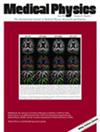Benchmarking deep learning‐based low‐dose CT image denoising algorithms
IF 3.2
2区 医学
Q1 RADIOLOGY, NUCLEAR MEDICINE & MEDICAL IMAGING
引用次数: 0
Abstract
BackgroundLong‐lasting efforts have been made to reduce radiation dose and thus the potential radiation risk to the patient for computed tomography (CT) acquisitions without severe deterioration of image quality. To this end, various techniques have been employed over the years including iterative reconstruction methods and noise reduction algorithms.PurposeRecently, deep learning‐based methods for noise reduction became increasingly popular and a multitude of papers claim ever improving performance both quantitatively and qualitatively. However, the lack of a standardized benchmark setup and inconsistencies in experimental design across studies hinder the verifiability and reproducibility of reported results.MethodsIn this study, we propose a benchmark setup to overcome those flaws and improve reproducibility and verifiability of experimental results in the field. We perform a comprehensive and fair evaluation of several state‐of‐the‐art methods using this standardized setup.ResultsOur evaluation reveals that most deep learning‐based methods show statistically similar performance, and improvements over the past years have been marginal at best.ConclusionsThis study highlights the need for a more rigorous and fair evaluation of novel deep learning‐based methods for low‐dose CT image denoising. Our benchmark setup is a first and important step towards this direction and can be used by future researchers to evaluate their algorithms.基于深度学习的低剂量 CT 图像去噪算法基准测试
背景为了在不严重影响图像质量的情况下减少计算机断层扫描(CT)采集的辐射剂量,从而降低对患者的潜在辐射风险,人们做出了长期的努力。目的最近,基于深度学习的降噪方法越来越受欢迎,大量论文声称其性能在定量和定性方面都在不断提高。方法在本研究中,我们提出了一种基准设置,以克服这些缺陷,提高该领域实验结果的可重复性和可验证性。结果我们的评估显示,大多数基于深度学习的方法在统计上表现出相似的性能,过去几年的改进充其量只是微不足道。结论这项研究强调了对基于深度学习的新型低剂量 CT 图像去噪方法进行更严格、更公平评估的必要性。我们的基准设置是朝着这个方向迈出的重要的第一步,未来的研究人员可以用它来评估自己的算法。
本文章由计算机程序翻译,如有差异,请以英文原文为准。
求助全文
约1分钟内获得全文
求助全文
来源期刊

Medical physics
医学-核医学
CiteScore
6.80
自引率
15.80%
发文量
660
审稿时长
1.7 months
期刊介绍:
Medical Physics publishes original, high impact physics, imaging science, and engineering research that advances patient diagnosis and therapy through contributions in 1) Basic science developments with high potential for clinical translation 2) Clinical applications of cutting edge engineering and physics innovations 3) Broadly applicable and innovative clinical physics developments
Medical Physics is a journal of global scope and reach. By publishing in Medical Physics your research will reach an international, multidisciplinary audience including practicing medical physicists as well as physics- and engineering based translational scientists. We work closely with authors of promising articles to improve their quality.
 求助内容:
求助内容: 应助结果提醒方式:
应助结果提醒方式:


